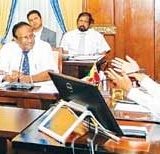Down–To-Earth: The Hard Truths Of Eelam War IV
“Just as in Kosovo if enough civilians died in Sri Lanka the world would be forced to step in” – Pulidevan of LTTE to a pal in Europe (quoted in Harrison 2012: 63).
Guided by a series of studies that I have indulged in over the years 2010-15, let me summarize my findings in point form. The focus is on the period 2008-to-May 2009. However, four facets of the broad historical context must be stressed initially: (I) Prabhākaran had one goal only: Eelam and a separate state; (II) the LTTE used two ceasefire periods in 1995 and 2001-06 as recuperating periods for renewal of their war effort; (III) as Ben Bavinck and the UTHR reports have insisted Thamilīlamunder the Prabhākaran was a fascist state; and (IV) the Rajapaksa government which struggled for survival against the LTTE proved the validity of the Marxist dictum that there is an unity in any contradiction: it became distinctly authoritarian itself, albeit still populist in its self-convictions.







